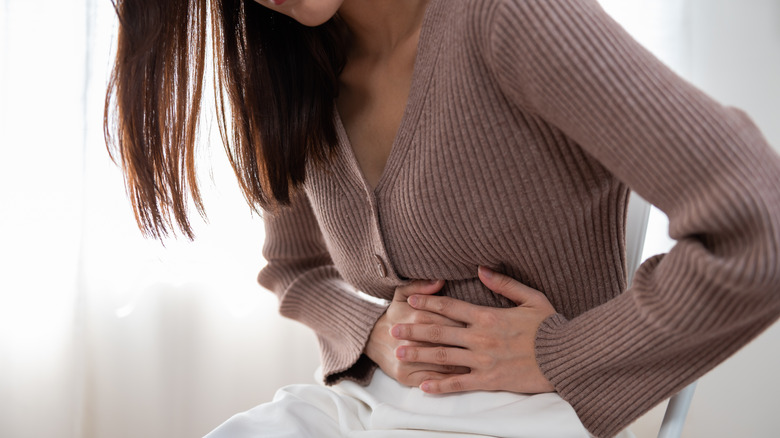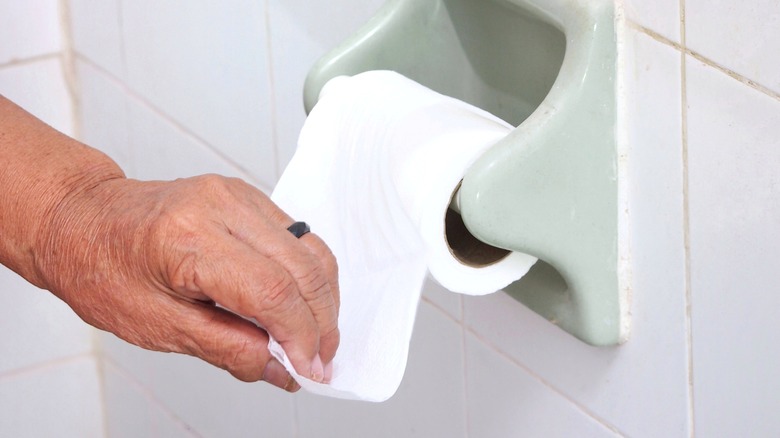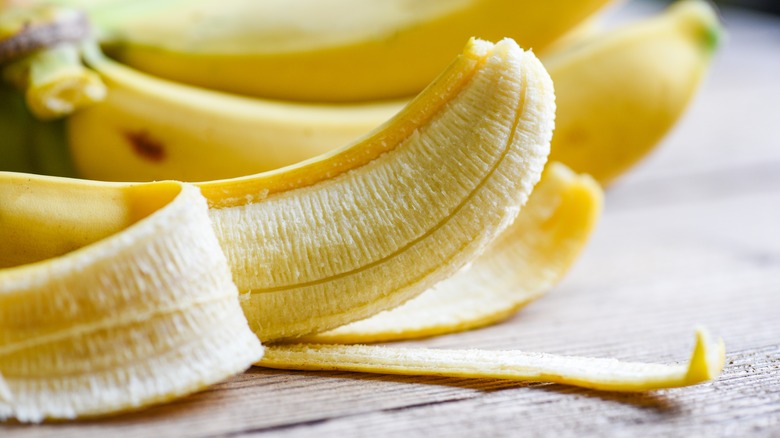How To Quickly Relieve Diarrhea
If the frequency of your restroom visits has increased over time, it might be a cause for concern. This is especially true if your stool is loose or watery. You probably have diarrhea. According to Johns Hopkins Medicine, diarrhea is a condition involving watery or loose stool that, in its acute form, typically lasts between 1 and 2 days.
Although diarrhea usually resolves by itself, diarrheal-related diseases caused approximately 1.6 million deaths worldwide in 2017 (via Our World in Data). Globally, it's responsible for the deaths of over 525,000 children under the age of 5 each year, reports the World Health Organization.
The National Institute of Diabetes and Digestive and Kidney Diseases (NIDDK) lists some symptoms often experienced by people with diarrhea, such as cramping, the urgent need to visit the bathroom more frequently than usual, abdominal pain, and loss of control over bowel movements.
While diarrhea typically goes away on its own, severe or prolonged diarrhea might require treatment to prevent excess fluid loss. This might be particularly dangerous for small children, the elderly, and people with weakened immune systems. If the symptoms are severe, seeing a doctor for diarrhea is always best.
Common causes and types of diarrhea
Understanding what causes diarrhea is a great way for people to prevent or manage the condition. According to the Cleveland Clinic, there are three common types of diarrhea: acute, persistent, and chronic.
Acute diarrhea is the standard type which is characterized by loose and watery stool that typically persists for up to two days. This type often clears up on its own and doesn't require any treatment. According to the clinic, persistent diarrhea is loose stool that persists for up to four weeks.
Chronic diarrhea is watery stool often caused by underlying health issues, says Johns Hopkins Medicine. This diarrhea type lasts at least several weeks, if not longer, or it comes and goes over a long period of time. It is associated with conditions like irritable bowel syndrome (and other functional bowel disorders) or Crohn's disease.
According to Healthline, a common cause of diarrhea is viral gastroenteritis, commonly known as the stomach flu. This disease usually develops after consuming contaminated food or after having exchanged personal items with someone with the virus.
Other causes of diarrhea include radiation therapy, malabsorption of food, medications, food allergies and intolerances, and bacterial infection (that may cause food poisoning), says the Cleveland Clinic.
How to quickly treat diarrhea
Although diarrhea usually clears up after a few days, various home remedies are available to help treat the condition. An antidiarrheal medication, for example, can help. According to Healthline, these medicines can start to work shortly after the first dose and can be purchased over the counter without a prescription. Some popular choices include Pepto-Bismol and Imodium.
However, the NIDDK warns against antidiarrheal medications for people who are experiencing fever and bloody stools, which are signs that they may have an infection with bacteria or parasites. You should also consult a doctor before giving over-the-counter medication to a child. The original Pepto Bismol, for example, is not safe for children under the age of 12.
Drinking water is important, since a major side effect of diarrhea is dehydration. Loose and watery stools make use of the electrolytes and fluids in your system, which can leave you feeling dizzy, extra thirsty, and confused, says Medical News Today. The source advises consuming at least a cup of fluid after each restroom visit to replace lost electrolytes. You'll want to sip slowly if you're also having nausea.
Diet adjustments can also help relieve diarrhea. According to Cleveland Clinic, making changes to your diet can help reduce your diarrhea and even eliminate it. Per the source, certain foods that are low in fiber can make your stool firmer.
Foods to eat and avoid when you have diarrhea
For firmer stools, WebMD advises eating bananas, yogurt, applesauce, potatoes, and smooth peanut butter. Rice, especially rice water, is another ideal option, says Healthline.
Rice water provides your body with the needed fluids. It might also reduce how long diarrhea lasts, because when rice water makes its way to the digestive tract, its binding effect can make the stool bulkier and firmer, according to Healthline.
According to the Cleveland Clinic, sweet and salty liquids can help guard against dehydration. Sugar from the fluids helps your body absorb the salts, while salt slows down your fluid loss, says the clinic.
Some liquids that may help replace electrolytes include fruit juice, sports drinks, broth, and even caffeine-free soft drinks. The NIDDK suggests that older adults and people with weakened immune systems drink oral rehydration solutions such as Pedialyte.
Don't forget soluble fiber. While you shouldn't eat too much of it, foods with soluble fiber can absorb the fluids in your intestines, resulting in firmer stools (via Medical News Today). Some good choices include bread, pasta, fruits and vegetables, and legumes.
According to WebMD, the worst foods for people with diarrhea include beans, cabbage, spicy meals, fatty or fried foods, and caffeinated drinks such as soda and coffee.
How the condition is diagnosed
If your diarrhea is chronic or severe, your doctor may need to take you through a series of tests to be able to adequately diagnose the cause. According to Johns Hopkins Medicine, you may have to take blood and urine lab tests and report on your past health for a more detailed diagnosis.
When it comes to blood tests, the Mayo Clinic notes that a complete blood count test, a kidney function test, and a measurement of your electrolyte levels will help identify how severe your diarrhea is.
A sigmoidoscopy is a common test that offers a clear view of the inside of your rectum and the lower part of your colon, says the Cleveland Clinic. The test features a lighted tube and camera and is ideal for diagnosing and treating bowel disorders and, in some cases, cancer.
According to the Mayo Clinic, an endoscopy is another diagnostic method. During the procedure, your doctor uses a long, thin tube with an attached camera to observe your upper small intestine and stomach. A tissue sample might be taken to aid in further analysis, explains the clinic.
You might also have to give a stool sample in which the doctor will check for bacterial infections, blood, inflammatory markers, or parasites in your system, says the Cleveland Clinic.
When to see a doctor for diarrhea
It's important to see a doctor if your diarrhea lasts longer than two days or if you have bloody or black stools, a fever above 102 degrees Fahrenheit, or severe abdominal or rectal pain, says the NIDDK. You should also consult with your doctor if you show signs of dehydration or pass more than five loose stools in a single day.
If you have a child younger than 12 suffering from diarrhea, WebMD advises against administering drugs such as Pepto-Bismol and Kaopectate, as they can cause adverse reactions. According to Medical News Today, a doctor's visit is needed if your child has diarrhea that surpasses 24 hours, or if they show signs of dehydration.
Also, children and adults with a weakened immune system should contact a doctor as a first resort. The same advice goes for people with underlying medical conditions such as diabetes. Johns Hopkins Medicine advises visiting a doctor if the diarrhea is chronic and the number of stools increase.






